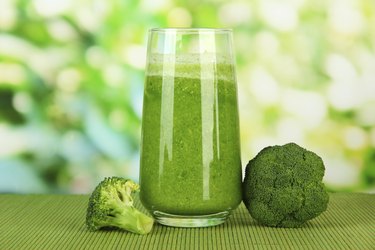
A member of the cabbage family, broccoli is more commonly served chopped -- raw or cooked -- than juiced. Drinking broccoli juice is another way to take advantage of the health benefits of this nutrient-packed food. Because the taste of pure broccoli juice can be strong, try blending it with sweeter juices such as apple, orange or carrot to make it more palatable. Combining it with other green juices -- collard greens or spinach, for example -- also works well. It takes 2 cups of chopped, raw broccoli to produce a 3/4-cup serving of fresh broccoli juice.
Rich in Iron
Video of the Day
Because iron is needed to produce blood cells, it is considered an essential mineral. Of special importance is that iron is needed to produce hemoglobin and myoglobin, two oxygen-carrying proteins which transport oxygen throughout your body. The daily recommendation for iron is 8 milligrams for adult men as well as for women 51 years and older. For women under the age of 50, the recommendation rises to 18 milligrams per day. A 3/4-cup serving of broccoli juice has 1.33 milligrams of iron, providing 17 and 7.4 percent of these daily recommendations.
Video of the Day
High in Folate
Folate is also known as vitamin B-9. Necessary for the production of DNA, folate is especially important during periods of rapid body development, including pregnancy and the teenage years. Folate is also important for healthy brain function and for your overall mental and emotional well-being. As a B vitamin, folate keeps your eyes, skin, hair and liver healthy; provides support to your immune system; and improves your body's ability to withstand stress. The daily recommendation of folate for adult men and women is 400 milligrams, rising to 500 milligrams for pregnant women and 600 milligrams for women who are breastfeeding. With 115 milligrams of folate per 3/4-cup serving, broccoli juice contains between 19.2 and 33.3 percent of the daily recommendation for folate.
Riboflavin -- A Natural Antioxidant
Riboflavin, like folate, is a member of the B vitamin group. It is also known as vitamin B-2. Like folate, it provides support to your immune system and improves your body's stress tolerating capacity. It also helps your body process fats and proteins. Riboflavin helps your body process vitamin B-6 and folate into usable forms and, as an antioxidant, protects your body's cells from free radicals, created when your body breaks down food. Free radicals can speed up the aging process, making you more susceptible to heart disease and cancer. With 0.2 milligrams of riboflavin per 3/4-cup serving of broccoli juice, you will receive between 19 and 27 percent of the daily recommendation of riboflavin. The daily recommendations of riboflavin are 1.3 milligrams for adult men, 1.1 milligrams for adult women, 1.4 milligrams for pregnant women and 1.6 milligrams for breastfeeding women.
A Source of Vitamin K
A 3/4-cup serving of broccoli juice has 185 milligrams of vitamin K. This is significantly more than 100 percent of the daily adequate intake for all adults, including women who are pregnant and breastfeeding. Vitamin K is also known as the blood-clotting vitamin because it helps your blood coagulate. Without it, you can get abnormal bleeding and difficulty healing from wounds and bruises. Vitamin K is also needed to help your body absorb calcium, making it important in keeping your bones and teeth strong.